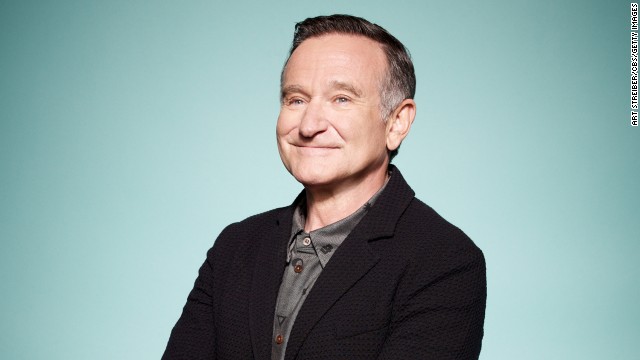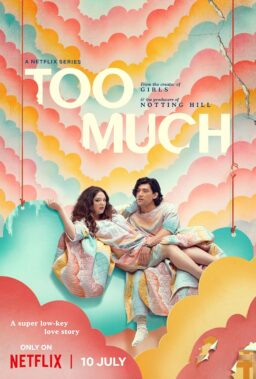1.
“Gilbert Gottfried: Robin Williams’ Generous Heart“: At CNN, the late comic’s “Aladdin” co-star pens a heartfelt remembrance following Williams’ suicide on Monday, August 11th. Related: Dante Basco (a.k.a. Rufio in “Hook“) writes his own farewell to the actor on his blog, while Norm MacDonald shares his memories of Williams via Twitter. See also: Marc Maron’s tribute to Williams on his WTF Podcast, including his profoundly revealing interview with the man taped on April 26, 2010.
“To see Robin perform was an experience. He was more than a comedian. He was a comedy force of nature. I remember hearing that Robin was once doing a press junket in Germany. One of the reporters asked him, ‘Why is it that Germany is not known for comedy?’ Robin answered, ‘Well, you killed all your funny people.’ I laughed out loud when I heard that. I thought, how sick and how wonderfully truthful. When I heard the news of Robin’s passing, it was a double shock. It was stunning that he was now gone and that, according to police, it was apparently suicide. I’ve known people who have committed suicide, and my shock always reveals how little I knew about them. Robin had spoken in the press about his substance abuse issues over the years, and he was dealing with it in rehab. I had heard at one point he was prescribed pills and that he didn’t want to take them because he was afraid it would interfere with his comic creativity. I thought, when I heard that, of his idol, Jonathan Winters. Robin worshipped the comedian, who died last year. Winters had his own problems and also was afraid medicating would interfere with his comic creativity.”
2.

“Lauren Bacall Dies at 89; in a Bygone Hollywood, She Purred Every Word”: Enid Nemy of The New York Times writes a fine obit for the iconic actress, who died Tuesday, August 12th.
“Though often called a legend, she did not care for the word. ‘It’s a title and category I am less than fond of,’ she wrote in 1994 in ‘Now,’ her second autobiography. ‘Aren’t legends dead?’ She also expressed impatience, especially in her later years, with the public’s continuing fascination with her romance with Bogart, even though she frequently said that their 12-year marriage was the happiest period of her life. ‘I think I’ve damn well earned the right to be judged on my own,’ she said in a 1970 interview with The New York Times. ‘It’s time I was allowed a life of my own, to be judged and thought of as a person, as me.’ Years later, however, she seemed resigned to being forever tied to Bogart and expressed annoyance that her later marriage to another leading actor, Jason Robards Jr., was often overlooked. ‘My obit is going to be full of Bogart, I’m sure,’ she told Vanity Fair magazine in a profile of her in March 2011, adding: ‘I’ll never know if that’s true. If that’s the way, that’s the way it is.’”
3.

“Paying Attention“: Jonathan Beller of Cabinet Magazine writes an immensely provocative piece on the modern battle for our attention.
“With the increasing banality of globalization, a new attention to attention is emergent. Networks and film production companies dream up new ways to sell eyeballs to advertisers (as industry parlance has it), internetworks reconceive themselves as the media companies that they are (Yahoo!, Google), and ‘angel’ investors pour hundreds of millions into social networking platforms (MySpace, Friendster). This is the attention economy, built upon the premise becoming conviction, becoming fact, that human attention is productive of value. How has it happened that whether conceived of as informal workers, content providers, gamers, consumers, prosumers, or audiences, we, the people of Earth, still have something that corporations want? Like clean air, attention is something that once could be had for free but is now being encroached upon as the next and perhaps final frontier. Attention is now a commodity, and a special kind of commodity at that.”
4.

“The Best Part of ‘The Killing: Season 4’ Is This 25-Year-Old Actor”: BuzzFeed’s Jarett Wieselman interviews actor Tyler Ross about his breakout TV role. See also: Roger Ebert’s three-star review for Nathan Adloff’s splendid indie, “Nate & Margaret,” in which the critic calls Ross “a precise and quiet actor who’s very effective at portraying a young man having an experience for the first time.”
“’The reason I was so drawn to ‘The Killing’ in the first place was because the writing portrays the characters in such human ways without being gratuitous. Nothing is gratuitous. It’s intelligent storytelling about people,’ he said. ‘I have mixed feelings about the military in general,’ Ross added, momentarily pausing to choose his words carefully. ‘I have military in my family, and I’ve seen what it’s done to them, for better or for worse. I can’t take a stance one way or another, but I think it’s a really interesting thing worth exploring. I want to tell stories that get people to ask questions about everything. But that goes along with my definition of art because if you’re preaching at people, if you’re telling them what to think, you might as well be doing a sermon. I would rather present someone with an idea that makes them think things they normally wouldn’t ask themselves. That’s what I want to do because that can make people better.’”
5.

“History of Film: Lawrence of Arabia”: Omer M. Mozaffar of RogerEbert.com writes an excellent piece on David Lean’s 1962 masterpiece for Movie Mezzanine.
“Speaking of the White Saviors of Hollywood cinema, many will recognize its obvious influences on such films as Avatar and Dances with Wolves. To be fair, as frequently as the film praises his endeavors leading the Arabs, it also critiques it, commenting that a British foreigner came in and created a mess of the Arabs. But, that recurring thread of the Caucasian elite helping the vulnerable persons of color streams through such modern films as ‘Elysium,’ ‘The Blind Side,’ and ‘Django Unchained.’ Even ‘12 Years a Slave’ finds its White Savior in Brad Pitt. But even then, these were all, to varying degrees, emotionally successful films. Moving beyond the cinematic wonder and through the fourth wall, this film is a mixed message. Speaking of race in this film, the initial problem, is that this formula is so common, that we do not notice it. The British accent gives us a sense of authenticity and dignity. The British savior, however, seems like something normal. The deeper problem, however, is that persons of color internalize these sentiments in various forms of inferiority and self-hate. The whole of Bollywood — the world’s largest film industry — is a frequent exercise in White supremacy by people of color.”
Image of the Day

Fandor‘s Brandon Harris lists 25 films that he considers “The Essential Black Independents.”
Video of the Day
A scene from Gus Van Sant’s acclaimed 1997 drama, “Good Will Hunting,” featuring Robin Williams in the role that won him a well-deserved Oscar. The park bench where Williams and Matt Damon are seated has been turned into a memorial.












